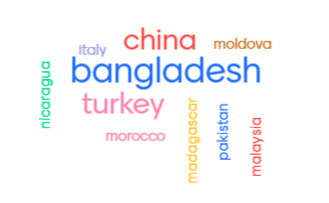The workshop looked at participants’ engagement and awareness of globalisation and the role that global business had played in this – the Menti word cloud, above, explored where the clothes of participants had been made – if illustration was needed of how globalisation is ever present in our lives, this Menti demonstrated this.
In any exploration of the issues of the power of business, educators often meet the objection that they are anti-business; to show participants how to address this, we explored again via Menti the positives that business bring, while then exploring the challenges that need to be addressed, which was so eloquently put by the UN Secretary General’s Special Representative on Business and Human Rights who said:
“There is an unsustainable imbalance between the scope of markets and business organisations on the one hand and the capacity of societies to protect and promote the core values of social community.”
Our exploration of business and human rights took a quick history tour of the various phases of the industrialised / western world to regulate the power of business, going back to the anti-trust movement of the late 19th century. This brought us to an examination of Corporate Social Responsibility (CSR), where it came from, what it is about, what it is not about, who is promoting it and what of its critiques. As a business led process, it has its merits in prompting business to reflect on other aspects of its business other than the bottom line. Interestingly it is only the arch neo-liberals who have opposed it as ‘charity with other people’s money’ (i.e. the money of shareholders). We looked at how CSR can promote a sense of responsibility, however it does not and cannot hold business to account for actions that harm human rights. The crux of the matter is responsibility versus accountability; companies cannot be solely left to take upon themselves the responsibility to act in a certain manner. Like all bodies they must be held to account! Self-regulation is not enough.
Participants brainstormed on campaigns that they knew of where civil society (often coalitions of human rights and environmental NGOs, trade unions and social movements working together) sought to tackle very egregious abuses of rights. This led us to explore the myriad of CSR initiatives that can be company led, industry led and in some cases are multi-stakeholder initiatives, e.g. the Extractive Industries Transparency Initiative, supporting transparency regarding revenues earned in mining.
An input was given on the range of actions that are laid out in the Trócaire
Advocacy Manual on Business and Human Rights; this contains 21 separate actions that groups interested to engage a company can take part in. It situates the place of CSR initiatives and how these can be leveraged to create pressure, all within a context of appreciating their inherent limitations. These actions also engage with some of the new thinking on business and human rights encapsulated in the UN Guiding Principles on Business and Human Rights, developed in 2011. Participants then worked in groups and considered a case-study prepared for the workshop of an imaginary company with various teasers helping them to connect back to the 21 actions. Groups were asked to consider which action points were relevant to put pressure on companies to change their policies and practices that were infringing human rights which led to a good Q and A before we wrapped up.
In closing, the workshop encouraged participants to engage with the new work emerging from within the Irish Coalition on Business and Human Rights, an extensive resources list was also shared that would be of value to development educators in their work.
This blog was written by Mark Cumming, former Private Sector Advocacy Officer in Trócaire. He recently stepped down as Head of Comhlámh and is currently the Development Coordinator of the Sisters of St Louis while also engaging in freelance education, training and facilitation work. He can be contacted
here.
Photo Credit: Human rights by Nick Youngson










